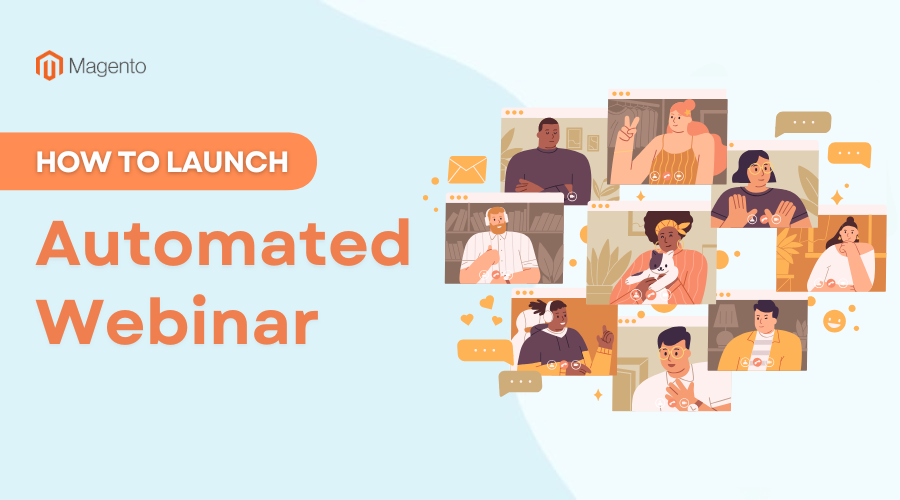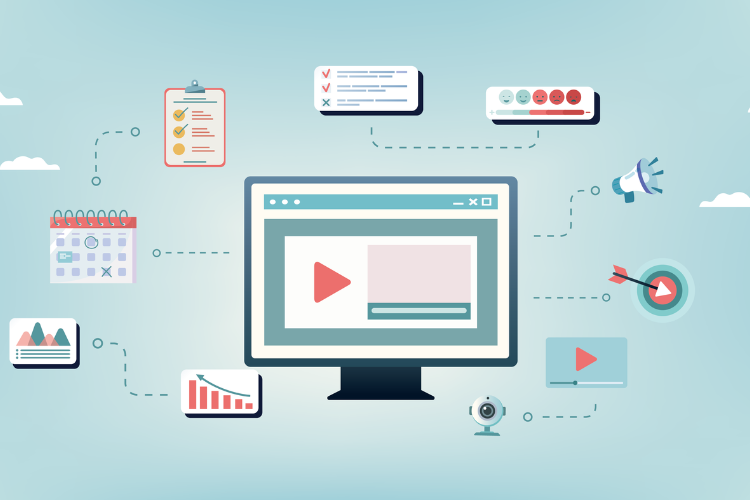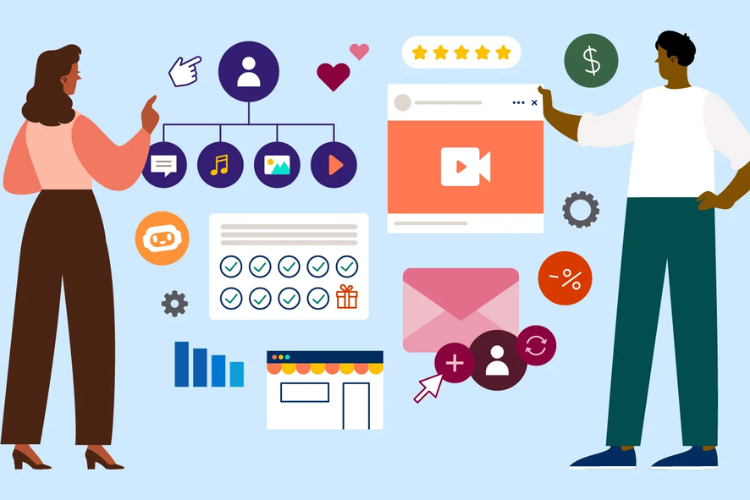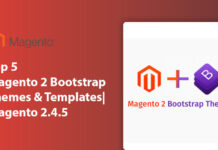
Imagine hosting a webinar that runs automatically, working for you 24/7, even when you’re asleep. Well, it’s more than possible.
With the right tools and setup, you can have a webinar that delivers your content, engages your audience, and drives sales—all without needing to be there live. Whether you’re a seasoned entrepreneur, a coach, or just someone with valuable knowledge to share, launching an automated webinar is a game-changer.
But did you know that automating your webinars is just one step in optimizing your entire online business? For eCommerce businesses, leveraging automated webinars with a solid platform like Magento 2 or optimizing your website’s development and design can significantly boost your performance. Adding the latest trends, such as Progressive Web Apps (PWA), and taking advantage of eCommerce’s evolving landscape can further elevate your approach.
Table of Contents
I. How to launch automated webinars: Step-by-step guide

Webinars are a way to share valuable content and even boost your sales. But what if you could run a webinar without being there live?
Here’s how to create an automated webinar.
Step 1: Pick the right automated webinar tool
Not all platforms are the same, and picking the right one will set the foundation for your automated webinar’s success. Look for platforms that offer automation, like pre-recorded webinars, automated email reminders, and scheduling. You’ll want something that’s easy to use and integrates with your other tools, such as Magento 2 for eCommerce or your content management system (CMS).
For example, if you’re developing an online store on Magento 2, consider how your webinar software will integrate with your platform’s design and checkout system. Certain webinar tools even allow you to simulate a live experience with features like live chat and polls, helping you engage users as they interact with your website. This creates a more personalized experience for your audience and can drive engagement with your eCommerce platform.
Step 2: Create a compelling webinar
The best way to create automated webinars is to provide real value to your audience, so focus on solving a problem or addressing a need. For example, if you’re a coach, discuss strategies to help your clients achieve their goals. If you sell a product, explain its benefits and demonstrate how it works.
Your goal here is to keep the content engaging and actionable. You don’t want to overwhelm your audience with more information. Keep it concise and easy to follow. A webinar should typically last between 45 minutes to an hour—just enough time to provide value without losing your audience’s attention.Additionally, if you’re discussing topics like website development or mobile app optimization, ensure your content is tailored to the needs of your viewers, such as optimizing their Magento 2 store for mobile or enhancing their website’s user experience.
Once the script is ready, set up a quiet, well-lit space to record. You don’t need a professional studio to make a great video. A simple microphone, webcam, and webinar recording platform are all you need to create a quality webinar. For instance, consider leveraging Progressive Web Apps (PWA) or the PWA Studio if your webinar includes app development topics. This could be a great opportunity to show your audience how they can enhance their eCommerce stores with cutting-edge mobile technology.
Step 3: Setup your webinar

Setting up an automated webinar is where the magic happens. You’ll upload your pre-recorded video onto your automated webinar system and configure it to play automatically at set times or based on user activity. If you’re hosting a webinar about Magento 2, website development, or eCommerce trends, this step will allow you to deliver your content at scale, making it accessible to your audience whenever they need it.
Here’s how to setup an automated webinar:
- Upload the Video: Most platforms allow you to upload a recorded video easily through their dashboard or cloud storage. For Magento 2 tutorials, you can upload detailed guides, demos, and case studies of successful store setups.
- Set Up Your Schedule: Choose when and how often your automated webinar will run. You can set it to repeat at certain intervals or offer on-demand access. If your webinar addresses a popular topic like mobile app development or PWA integration with Magento 2, offering on-demand access can help you reach a broader audience over time.
- Customize the Webinar Registration Page: Create an engaging registration page with a catchy title, brief description, and a clear call to action.
- Automate Email Reminders: Set up automated reminders to notify your registrants when the webinar is starting or if there’s a replay available.
- Interactive Features: Some platforms allow you to add live chat features or surveys that can simulate live interactions during your automated webinar. This helps make the experience feel more personalized and engaging. You can even incorporate Magento 2-specific surveys to gather feedback on users’ eCommerce experiences, which can help tailor future content.
Once you’ve set everything up, run a test to ensure everything works seamlessly before going live. A little testing goes a long way in preventing hiccups on the big day!
Step 4: Automate your email marketing
You want to remind potential attendees about your webinar and get them excited to join. Start by sending a confirmation email after they sign up, letting them know when the webinar will take place.
In the days leading up to the event, send reminder emails to keep your webinar top-of-mind. You can also add a personal touch with a “Thank You” email or a sneak peek of what they’ll learn. . For webinars on website development or mobile app development, provide attendees with a brief preview of exciting topics, such as how to integrate PWA with Magento 2 or latest trends in eCommerce technologies. These emails help build anticipation and increase the likelihood of attendees showing up.
Lastly, consider a follow-up after the webinar (whether they watched live webinars or the automated version). Send an email to thank viewers for attending and encourage them to take the next step—whether that’s signing up for your service, buying a product, or scheduling a consultation.
Step 5: Promote your webinar

Social media is one of the best ways to spread the word. Create engaging posts with a compelling call to action and encourage your followers to sign up. Share snippets of your Magento 2-focused webinar content, such as how to improve store conversions or tips for mobile optimization, to entice your audience.
Moreover, consider running paid ads on Facebook, Instagram, or Google to attract a broader audience. Partnering with influencers in your niche or collaborating with others can help you reach more potential attendees.
Step 6: Analyze and improve
Once your automated webinar funnel is running, tracking its performance is important. Most automated webinar platforms provide detailed analytics on how many people attended, how long they stayed, and what actions they took afterward. These insights are invaluable for improving your future webinars.
You might also notice which calls-to-action are most effective in converting viewers into customers. Use this data to fine-tune your webinar for future success.
II. Why e-commerce trends are crucial for your automated webinar success?

The world of eCommerce is constantly evolving. Understanding e-commerce trends and staying updated on new technology can dramatically impact your webinar’s reach and success. From adopting PWA to integrating the latest website design principles, staying on top of these trends will ensure your content resonates with modern consumers.
With the integration of the right tools and strategies, like Magento 2’s configurations, mobile app development, and incorporating PWA, you can make your automated webinar a 24/7 sales machine that thrives even when you’re not around.
Final thoughts
Launching your first automated webinar may seem like a big task, but with the right tools and approach, it can be a rewarding experience. Every step, from selecting the best automated webinar software to creating compelling content and marketing, contributes to your success.
By coupling these strategies with the latest eCommerce trends and utilizing platforms like Magento 2, your webinar can continue to work for you long after the initial launch.











![[SALE OFF] Discount 30% All Premium Extensions On Christmas And New Year 2025 christmas-and-new-year-2025](https://landofcoder.b-cdn.net/wp-content/uploads/2024/12/christmas-and-new-year-2025-1-218x150.png)






